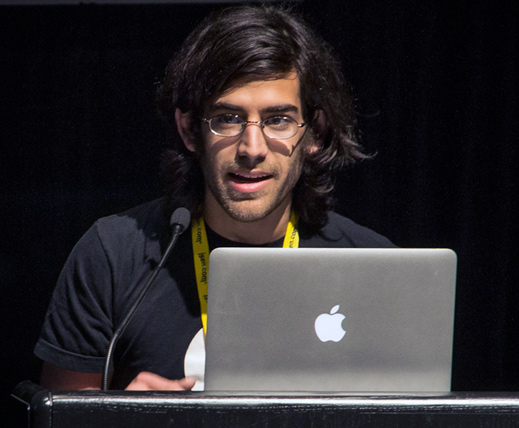Why Aaron Swartz’s Ideas Matter
Aaron Swartz, a precocious and uncompromising digital activist, tragically took his own life last Friday. He was just 26.

Swartz clearly touched the lives of those who knew him well in unique and wonderful ways, and the tributes posted online are testament to a special human being. But those who never knew him were affected as well—through the technologies he developed, his contributions to projects such as Wikipedia and the Internet Archive, and his untiring efforts to create a new understanding of digital rights and ownership, most prominently by helping create the Creative Commons.
In February of last year we interviewed him about his philosophy, and about his involvement in the campaign opposing SOPA, a bill that would’ve imposed more stringent rules on the sharing of digital information online (see “Aaron Swartz Hacks the Attention Economy”). You can read more about ideas in his 2008 “Guerilla Open Access Manifesto,” and you’ll find more of his writings in a collection gathered by the Internet Archive.
Swartz’s many accomplishments include helping to develop an early version of RSS, founding a company that merged with Reddit and was later bought by Condé Nast, and developing the Web application framework Web.py.
But it was in his role as a digital provocateur that his brilliance shone most brightly. By working on the technical standards for the Creative Commons, he helped extend the legal framework behind the free software movement to other creative endeavors. The impact is felt across the Internet and has helped reshape the public’s understanding of digital property rights more generally.
Swartz was also passionate about freeing information paid for by public money, and about empowering ordinary people to bring about political change. He founded Demand Progress, an organization that uses technology to push for civil liberties and political reform.
I corresponded with Swartz several times in recent years and found him impressive yet humble. I remember first reading about him some 12 years ago when, at the age of 14, he was part of the working group that had developed the specification for RSS 1.0, an exciting new standard that promised to let you automatically receive updates from websites. Even then, he seemed to represent the leveling promise of the Internet. It is unbearably sad that he will no longer be around to fulfill that promise.
Keep Reading
Most Popular
Large language models can do jaw-dropping things. But nobody knows exactly why.
And that's a problem. Figuring it out is one of the biggest scientific puzzles of our time and a crucial step towards controlling more powerful future models.
The problem with plug-in hybrids? Their drivers.
Plug-in hybrids are often sold as a transition to EVs, but new data from Europe shows we’re still underestimating the emissions they produce.
Google DeepMind’s new generative model makes Super Mario–like games from scratch
Genie learns how to control games by watching hours and hours of video. It could help train next-gen robots too.
How scientists traced a mysterious covid case back to six toilets
When wastewater surveillance turns into a hunt for a single infected individual, the ethics get tricky.
Stay connected
Get the latest updates from
MIT Technology Review
Discover special offers, top stories, upcoming events, and more.